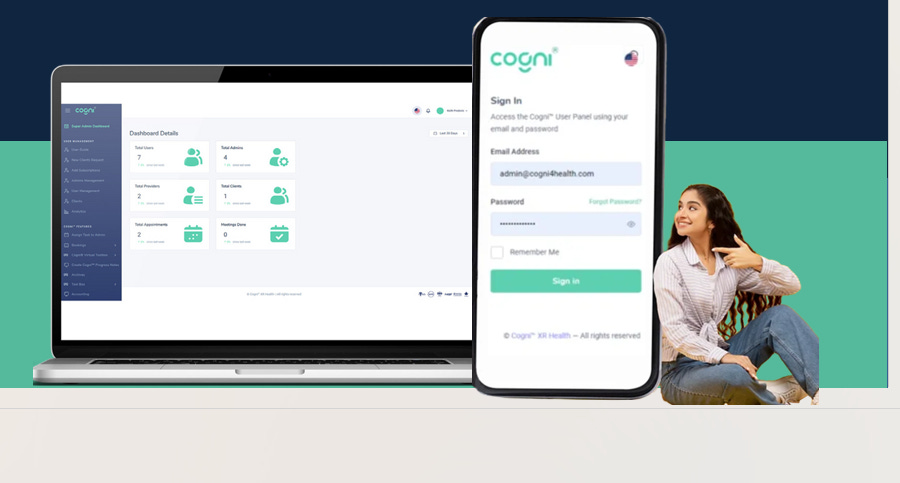Early intervention for every mind: how Cogni Corp+ Therapies is rethinking mental health assessment
Helping providers act earlier when it comes to mental health
Most people seek mental health care only once they’re near crisis - and many never return after two therapy sessions.
Canadian founder Emmanuella Michel is on a mission to change that. After 15 years’ working in community and government mental health programs - and her own lived experience with postpartum depression - she saw how little early or preventative support existed.
“What I’ve realised in the health system, especially mental health, is that we often wait until there’s a fire before putting preventive measures in place,” she says.
Her startup, Cogni® Corp+ Therapies, helps providers to act earlier. The platform’s algorithm helps clinicians and EAP providers save time and reduce administrative burden. It amplifies progress notes into data-driven insights that produce personalized recommendations across what Michel calls the eight dimensions of wellbeing: emotional, behavioral, physical, social, occupational, environmental, financial, and spiritual.
“We’re not diagnostic,” she explains. “We help providers optimize their intake process, turning it into a data-informed wellbeing journey that delivers tailored educational support aligned with each individual’s unique context and needs.”
The framework itself draws on the Eight Dimensions of Wellness model developed by researcher Dr Peggy Swarbrick, which encourages people to see mental health as interconnected with every part of daily life. Michel first encountered the approach while working with First Nations communities in Canada, where care is often holistic, land-based and community-centred.
“That really opened my eyes,” she says. “Mental health isn’t just emotional — it’s everything around us and with technology we are able to break barriers.”
Women’s mental health and lived experience
Although Cogni Corp+ serves both men and women, around 70 per cent of users are female. Michel believes that’s partly because women are more willing to acknowledge when they need help — and partly because the system itself rarely offers them timely, tailored support.
Her focus on women’s mental health also stems from personal experience.
“In 2019, when I gave birth to my second baby, I was dealing with postpartum,” she says.
“I was a provider dealing with my own postpartum, and it was very hard. If I’d had Cogni as my educational co-pilot, offering real-time insight and guided support— it would have helped immensely.”
She points to the way hormonal changes, perimenopause and fertility challenges can all intersect with mental health.
“When we think about women’s mental health, it’s not a one-size fits all approach,” she says. “There’s a physical, behavioural and environmental dimension too. You have to look at the whole person.”
Digital support and workplace wellbeing
Cogni Corp+’ first contracts have been with Canadian employers, including Health Canada.
Michel argues that workplace wellbeing “doesn’t just belong to the employee; it also belongs to the workplace.”
Lost productivity, absenteeism and turnover linked to untreated mental health issues cost Canadian employers millions each year. Cogni Corp+’s model helps organisations provide wellbeing support before those costs escalate — offering employees guided self-care and early assessment tools that can reduce burnout and support retention.
“Employers are starting to see mental health as a problem that triggers supply chain issues as much as a human one,” she says.
The idea with the Cogni Corp+ approach is not to be therapy, but to fill the gap between sessions or referrals — the time when people most often drop out of treatment - with support and education.
“Many go into therapy and then quit after one or two sessions,” she says. “Our tool is complementary. It helps the provider and the client keep going with the next step.”
Expansion to Europe
Emmanuella is now exploring pilots in France and the UK, where family doctors can prescribe digital mental health platforms.
“Europe’s framework allows providers to prescribe wellness platforms like ours,” she says. “I’m meeting employee assistance programs (EAP), workplace wellbeing and clinicians to see how we can support them and adapt for product-market fit.”
The company, currently bootstrapped with CAD $300,000 in non-dilutive funding and early revenue, is raising a $1.5 million seed round to expand.
Cultural nuance in mental health
Emmanuella’s experience working with Black networks of employees and First Nations communities shaped Cogni Corp+’s commitment to cultural sensitivity.
“Mental health is not one-size-fits-all,” she says. “For someone like me, from the Black community, it won’t appear the same way as for someone who is Caucasian.”
“When people are diagnosed, sometimes the cultural aspect gets missed. Our tools have to reflect that.”
Ultimately, Cogni Corp+’s goal is to make people more active participants in their own care.
“I want every individual to know they have within them what it takes to adapt and learn new ways on their route to wellbeing,” Emmanuella says.
“With the right tools, they can learn to take care of the specific dimension that’s challenging for them — and take control over their wellbeing.”
Cogni® Corp+ Therapies is one of nine startups selected for the 2025 Canadian Technology Accelerator (CTA) FemTech program organised by the Government of Canada. This program is free for the selected participants, and it provides access to mentors, a peer network, masterclasses delivered by subject matter experts on topics like the market landscape, IP considerations, fund raising, regulatory issues, public relations, and more, and a dedicated visit to the UK and France to connect founders with potential partners and customers. This article is part of a partnership with the High Commission Canada in the UK.




